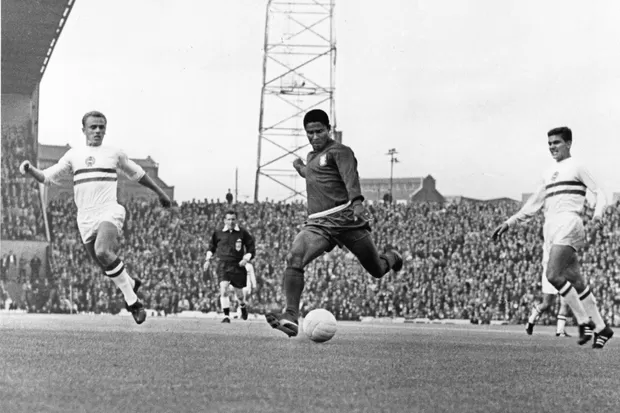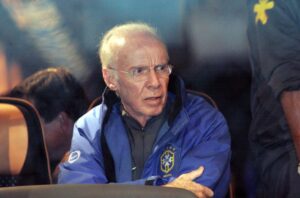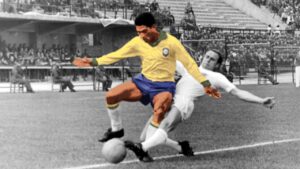15 Incredible Players Who Carried Their Nations at the World Cup
Football is a team game, but sometimes, one individual transcends the collective, hoisting their nation onto their shoulders and embarking on a heroic World Cup campaign almost single-handedly. These are the tournaments defined by a singular genius, where these incredible players’ brilliance, determination, and sheer force of will dragged their team further than anyone thought possible.
These aren’t just great performances; they are legendary feats of carrying a team, often against the odds. Moments where one player seemed to be everywhere, scoring crucial goals, creating chances out of nothing, and inspiring those around them through sheer talent and leadership. Their names become synonymous with that specific World Cup, forever remembered for their monumental efforts.
Witness the titans who shouldered the weight of expectation and delivered:
1. Diego Maradona (Argentina, 1986)
The quintessential example. Maradona didn’t just lead Argentina to glory in Mexico; he was Argentina. He scored or assisted 10 of their 14 goals, including the two most famous goals in history against England. His dribbling, vision, and leadership were on another planet, elevating an otherwise solid team to world champions. It remains the benchmark for individual dominance at a World Cup.
2. Eusébio (Portugal, 1966)

In Portugal’s World Cup debut, the “Black Panther” Eusébio was sensational. He won the Golden Boot with nine goals, carrying Portugal to a surprising third-place finish. His most iconic performance came against North Korea in the quarter-finals, where Portugal trailed 3-0 before Eusébio scored four incredible goals (two penalties) in a stunning 5-3 comeback victory. A truly heroic individual effort.
3. Paolo Rossi (Italy, 1982)
Rossi entered the 1982 World Cup having barely played for two years due to a match-fixing ban and looked rusty in the first group stage. Then, he exploded. He scored a legendary hat-trick against favourites Brazil to win the crucial second group stage match, both goals in the semi-final against Poland, and the opener in the final against West Germany. He won the Golden Boot and Golden Ball, single-handedly firing a previously uninspiring Italy to glory.
4. Roberto Baggio (Italy, 1994)
The “Divine Ponytail” dragged Italy kicking and screaming to the final in the USA. After a quiet group stage, Baggio scored five crucial goals in the knockout rounds: a late equalizer and extra-time winner against Nigeria, the winner against Spain, and both goals against Bulgaria in the semi-final. He played through injury and carried the hopes of a nation, only to suffer heartbreak in the final penalty shootout.
5. Hristo Stoichkov (Bulgaria, 1994)
Bulgaria had never won a World Cup match before 1994. Led by the fiery and brilliant Stoichkov, they stunned the world by reaching the semi-finals. Stoichkov was the driving force, joint-top scorer with six goals (including winners against Argentina and Germany), providing skill, goals, and fierce leadership that inspired an unfancied team to unprecedented heights.
6. Oleg Salenko (Russia, 1994)
While Russia crashed out in the group stage, Salenko’s individual goalscoring feat was remarkable. He scored a record five goals in a single World Cup match against Cameroon and finished as joint-top scorer (with Stoichkov) with six goals, despite only playing three games. A bizarre but undeniable case of individual brilliance in a failing team.
7. Gheorghe Hagi (Romania, 1994)
The “Maradona of the Carpathians” was magical in USA 94, leading Romania to the quarter-finals, their best-ever performance. Hagi scored three spectacular goals (including an audacious long-range lob against Colombia) and provided numerous assists, orchestrating Romania’s attack with incredible vision and technique.
8. Roger Milla (Cameroon, 1990)

At 38 years old, Milla came off the bench to become the unlikely hero of Cameroon’s fairytale run to the quarter-finals (the first African nation to reach that stage). He scored four crucial goals, celebrated with his iconic corner flag dance, and provided infectious energy and leadership that inspired the Indomitable Lions to shock the world.
9. James Rodríguez (Colombia, 2014)
With Radamel Falcao injured, the creative burden fell on James in Brazil. He responded magnificently, winning the Golden Boot with six goals (including the Puskás Award-winning volley against Uruguay) and leading Colombia to the quarter-finals, their best-ever finish. His flair and spectacular goals captivated the tournament.
10. Preben Elkjær Larsen (Denmark, 1986)
Spearheading the thrilling “Danish Dynamite” team in Mexico, Elkjær was a force of nature. His powerful runs, dribbling, and goalscoring (including a hat-trick against Uruguay) led Denmark through the group stage with three wins before they imploded against Spain. He embodied the fearless attacking spirit of that beloved team.
11. Enzo Scifo (Belgium, 1986)
While Elkjær provided the power for Denmark, Scifo provided the artistry for Belgium’s surprise run to the semi-finals in the same tournament. The elegant midfielder dictated play, scored crucial goals, and provided assists, earning the Best Young Player award and carrying Belgium’s creative hopes.
12. Just Fontaine (France, 1958)
While the French team was strong, Fontaine’s record-breaking 13 goals in six games was an individual feat that carried them to the semi-finals. Scoring in every single match, his clinical finishing was simply unstoppable and remains unparalleled in a single tournament.
13. Salvatore Schillaci (Italy, 1990)
“Totò” Schillaci was the surprise hero of Italia ’90. Starting the tournament as a substitute, his wide-eyed celebrations and knack for scoring crucial goals (six in total, winning the Golden Boot and Golden Ball) captured the hearts of the host nation and carried Italy to a third-place finish.
14. Davor Šuker (Croatia, 1998)
In Croatia’s stunning debut World Cup, Šuker was the lethal finisher who led the line. He won the Golden Boot with six goals, scoring in almost every match, including the winner in the quarter-final against Germany and in the third-place playoff victory. His goals were the spearhead of Croatia’s incredible run.
15. Lionel Messi (Argentina, 2014 & 2022)

While surrounded by talent, Messi’s influence, particularly in these two tournaments, was immense. In 2014, he dragged Argentina to the final, scoring crucial group stage winners and winning the Golden Ball. In 2022, he was even more dominant, scoring seven goals (including two in the final), providing key assists, and delivering the leadership that finally secured Argentina’s third star, cementing his legacy by carrying his nation to the ultimate prize.
These players remind us that while football is a team sport, moments of individual genius and unwavering determination can elevate a nation and define a World Cup.
Sources:
- Maradona 1986: Wikipedia (Diego Maradona), FIFA.com
- Eusébio 1966: Wikipedia (Eusébio), FIFA.com
- Rossi 1982: Wikipedia (Paolo Rossi), FIFA.com
- Baggio 1994: Wikipedia (Roberto Baggio), FIFA.com
- Stoichkov 1994: Wikipedia (Hristo Stoichkov), FIFA.com
- Salenko 1994: Wikipedia (Oleg Salenko), FIFA.com
- Hagi 1994: Wikipedia (Gheorghe Hagi), FIFA.com
- Milla 1990: Wikipedia (Roger Milla), FIFA.com
- James Rodríguez 2014: Wikipedia (James Rodríguez), FIFA.com
- Elkjær Larsen 1986: Wikipedia (Preben Elkjær Larsen), The Guardian (Danish Dynamite articles)
- Scifo 1986: Wikipedia (Enzo Scifo), FIFA.com
- Fontaine 1958: Wikipedia (Just Fontaine), FIFA.com
- Schillaci 1990: Wikipedia (Salvatore Schillaci), FIFA.com
- Šuker 1998: Wikipedia (Davor Šuker), FIFA.com
- Messi 2014/2022: Wikipedia (Lionel Messi), FIFA.com, Numerous news articles
- General Concept: Discussions on football forums, historical analysis articles
Do you want more? Check one more incredible post here.


